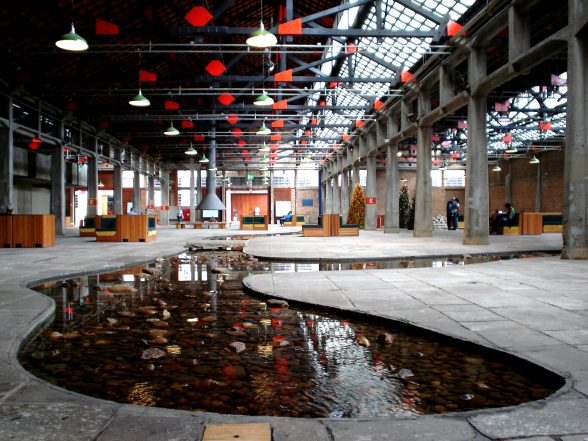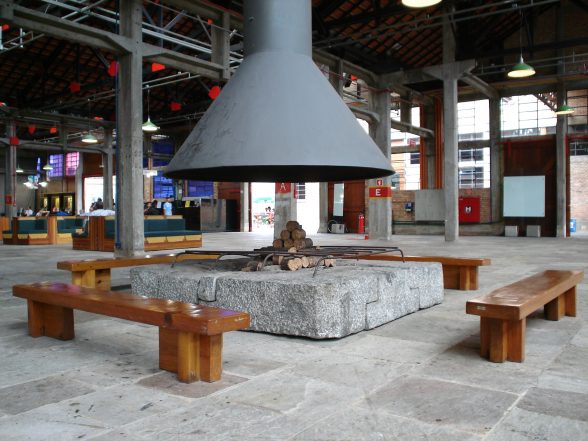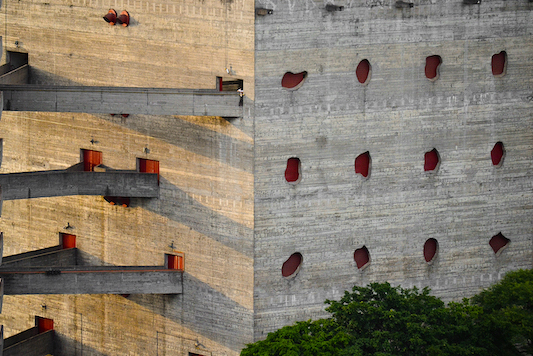Building of the month (February 2021): SESC Pompéia, São Paulo, Brazil
Lina Bo Bardi (1914-1992), an Italian-born architect and designer

SESC (Serviço Social do Comércio ) - Social Service of Commerce is a private organization supported by entrepreneurs in businesses, tourism and services. Inspired by concepts from the Cartar da Paz Social (Letter for Social Peace), it aims to provide well-being and quality of life to professionals working in these industries and their family members. SESC’s initiatives stem from a solid cultural and educational project that has borne the mark of innovation and social transformation since it was established by the business and services community in 1946.Throughout its more than 70 years, SESC has been innovating by introducing new models of cultural action and, in the ‘80s, underscored education as a basic tenet for social transformation. It has been fulfilling its purpose through concentrated efforts in the field of culture and its many forms of expression, reaching audiences that span all age groups and social strata. That means not only offering a wide variety of activities, but also making an effective contribution to more long-lasting and meaningful experiences.SESC’s network in the state of São Paulo includes 43 locations dedicated to culture, sports, health and food, children and youth development, senior citizens and social tourism, among others. The venues feature different architectural styles and influences and were conceived in collaboration with renowned architects, such as Lina Bo Bardi and Paulo Mendes da Rocha, who designed SESC Pompeia and SESC 24 de Maio, respectively.The organization’s reach in the state of São Paulo extends well beyond city facilities dedicated to social and cultural activities. Cultural and sports initiatives occupy streets, squares, parks and other spaces, and tons of food, provided by donor businesses, are handed out to social organizations through projects such as the Circuito SESC de Artes (SESC Art Circuit), Dia do Desafio (Challenge Day) and Mesa Brasil (Brazil Table), held in partnership with city halls and local trade unions.Other channels that help to increase access to SESC’s programs and cultural assets are its web Portal, SESC SP, SESC TV, a publishing house - Edições SescSP, a record label - Selo Sesc, and magazines Em Cartaz (What’s On), Mais 60 (60 More) and Revista E (Magazine E).Sesc São Paulo’s technical team currently comprises more than 7.000 employees and, therefore, people management involves many actors, activities and processes at all levels of the organization. The diversity of Sesc’s staff paves the way towards providing better quality services and fulfilling its mission to the best of its abilities.The considerable knowledge acquired by Sesc throughout its long journey following these tenets has led it to become a policy-making reference in its many fields of operation. In recent years, the institution has been invited to join boards, committees, associations, collegiate bodies, forums and various working groups. Today, Sesc São Paulo representatives sit in the advisory and executive bodies of 50 national and international art, sports, culture, health, environment, tourism, social services and human rights organizations.
Sesc’s ongoing and non-formal education initiatives aim to foster the development of its many different audiences by encouraging their autonomy, and contact and interaction with different forms of expressions, ways of thinking, acting and feeling.

